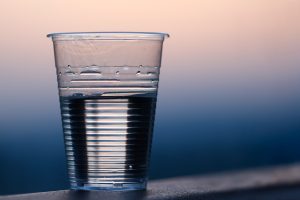
Photo source: YouTube
Babies and lead don’t mix. Lead, a heavy metal, can damage the brain and nervous system. If babies ingest even small amounts of lead from their environment, it can cause learning and behavior problems, slow growth and development and hearing and speech problems.
According to the CDC, lead-based paint is the most widespread and dangerous source of lead for young children. Babies can be exposed to lead from several other sources as well, including water, toys, dust, soil and baby food.
As you may know, a recent Environmental Defense Fund (EDF) study, which analyzed the results of another study, the FDA’s Total Diet Study, found that roughly 20 percent of baby food samples surveyed contained detectable levels of lead. The study also found that more than 1 million children consume more lead than the FDA’s limit of 6 micrograms/day for young children. (The FDA is currently reevaluating this lead standard; no safe level of lead in blood has been identified.)
If you’re the parent of an infant or about to be, you may be wondering about what to do to reduce your baby’s lead exposure, especially if you buy or you’re considering buying commercially prepared baby food.
I wondered myself so I asked Maida Galvez, MD, MPH, associate professor of environmental medicine and public health at the Icahn School of Medicine at Mount Sinai for her take on the situation. She’s also featured in this short video about the EDF study. This Q & A provides baby food for thought.
Q: Is the EDF study on lead and commerically-prepared baby food an argument for making your own baby food?
Dr. Galvez: Based on the results of the EDF report, a major goal would be to push for stricter federal regulations of the amount of lead that is acceptable in baby foods. We would also encourage parents to contact their favorite food brands to see if they screen their products for lead. As the report was not able to determine the source of lead contamination, we do not yet have food specific recommendations beyond encouraging children to eat a variety of foods.
As per Dr. Galvez’s suggestion, Babyproductsmom called four leading baby food manufacturers (the customer service line) and asked this question: “Do you test your baby food for lead?” Here’s what they said:
Gerber, 1-800-284-9488:
“We test our products to the best available guidelines. Our products meet government requirements. We tested 2,000 food and juices within the past 3 years. They fell within the FDA guidelines for lead. But, there are no FDA guidelines for lead.” (That’s right. The FDA’s 6 microgram daily limit is the most lead allowed per day from any source. It doesn’t currently have guidelines for lead that apply to the entire baby food category. The FDA does put lead limits on water and fruit juice, however. For apple juice, the limit is 30 parts per billion (ppb) and 50 ppb for grape juice. The limit for bottled water is just 5 ppb.) Check out what else Gerber has to say about the lead issue.
Beech Nut, 800-233-2468:
“We’re always testing for heavy metals. We reject our raw materials. They tested for 255 contaminants, lead being one of them.”
They also said: “Our guidelines are much stricter than what the FDA requires. If lead is present, only trace amounts are allowed. We don’t have anything to hide. We test everything that comes into our plant.”
Check what else Beech Nut has to say about lead.
Plum Organics, 877-914-PLUM
“We’re working on implementing a procedure. Our goal is to have it in place within the next 12 to 24 months. There is lead present in the soil and water. We’re working with the Environmental Defense Fund regarding lead, to be able to implement the procedure.”
In a follow-up e-mail:
“As part of our commitment and our recent conversations with the Environmental Defense Fund, we’re creating new guidelines for heavy metals in our ingredients.”
Earth’s Best, 800-442-4221:
“Lead is present in the soil and water. Trace amounts may be detected. We don’t test for lead specifically. The FDA monitors the food supply for lead. And our products fall under the FDA.”
BPM: The EDF says the FDA and food manufacturers can and must do better to reduce lead in food, especially baby food. Food manufacturers shouldn’t wait for the FDA to act. The EDF recommends that food manufacturers regulate themselves and set a goal of less than 1 ppb of lead in baby food and other foods marketed to children.
Q: Would you recommend that parents avoid giving fruit juice to babies and toddlers, especially grape, mixed fruit, apple and pear juice (juices in the EDF study found to have the highest amounts of lead)?
Dr. Galvez: According to the recent American Academy of Pediatrics (AAP) guidelines “fruit juice offers no nutritional benefits over whole fruit for infants and children and has no essential role in healthy, balanced diets of children.” Juice should be avoided in children under one year. Children ages 1-3 can have up to 4 ounces – or half a cup – per day. Children ages 4-6 can have 4-6 ounces (up to three-quarters of a cup). Children ages 7-18 can have up to 1 cup, as part of their daily intake of 2.5 cups of fruit. Note that children do not need juice at all for a healthy diet.
Q: When advising parents to feed their kids a variety of foods to help reduce lead exposure, is it a good idea to switch up the brands of baby food as well?
Dr. Galvez: The EDF did not have information on brands. Therefore, we would not be able to recommend one brand versus the other. We would encourage individual companies to pursue their own lead testing and report their results publicly. Likewise, we would encourage consumers to reach out to their favorite brands to learn more.
Q: Is organic food likely to contain the same amount of lead as food that’s conventionally produced (if lead is present)?
Dr. Galvez: The EDF study reported lead in both conventional and organic foods.
Q: Besides providing a varied diet, what else can parents do to reduce their child’s exposure to lead?
Dr. Galvez: It is critically important to prevent lead poisoning by reducing or eliminating sources of lead in children’s environments, including lead paint in older homes, contaminated dust/soil, water, and foods. If your home was built before 1978, contact your local department of health to see if testing can be arranged.
Q: Is it okay to use tap water to prepare infant formula, or is it better to use commercially sold purified “infant” water?
Should parents take the time to get their tap water tested (if they’re on well water) or filter their tap water if they’re on city or well water?
Dr. Galvez: Lead can enter the drinking water supply from pipes and faucet fixtures found in the plumbing of some buildings. The AAP recommends contacting your local health department to determine if tap water is safe to use for baby formula. If you have a private well, you have to do your own testing (contact your local health department for more information). In general, any type of clean water- tap or bottled- can be used to prepare infant formula.
There are other measures that you can take to reduce the risk of lead exposure from tap water including:
- Running the water for 1-2 minutes prior to drinking or making formula.
- Using cold tap water, and
- Cleaning the faucet screens. Please see the Pediatric Environmental Health Specialty Units (PEHSU) fact sheet about lead in drinking water for more information.
Q: Do you recommend lead testing for your pediatric patients?
Dr. Galvez: The American Academy of Pediatrics recommends all families with infants 6-9 months discuss potential lead risk factors with their pediatrician. Children 6 and under who are on Medicaid or living in poverty, foreign born children, and children living in older housing are at higher risk of lead exposure and blood lead screening may be warranted. In New York State, the recommendation is to screen with blood lead levels at ages 1 and 2 years.
Q: Does lead become less of a threat as kids get older?
Dr. Galvez: Lead is toxic for children of all ages. However, younger children are at higher risk of exposure because they have age appropriate hand to mouth behaviors which can lead to ingestion of lead containing products such as paint chips or contaminated dust/soil. Young children, whose brains are developing, are at higher risk for the detrimental effects of lead.
Bottom line: Do everything you can to protect your child from lead by:
- Feeding your baby and older children a variety of foods. Variety helps reduce your child’s chances of getting too much lead from any one source. A varied diet can also help prevent your baby’s body (and yours) from absorbing lead.
- Getting your home tested for lead if it was built before 1978 (like mine was).
- Asking the pediatrician if lead testing if appropriate for your child; it’s the law at ages 1 and 2 years in many states.

Source: Pexels/Meir Roth
- Testing your drinking water to make sure it doesn’t contain lead.
- Calling baby food manufacturers yourself and ask about lead testing. Hey, the squeaky wheel gets the grease—and the lead out!
Preventing lead from entering the food supply is a complex issue because lead is in soil and water. And, it isn’t a new problem. Here’s more from the FDA about lead in the food supply.
Thank you to Dr. Maida Galvez for participating in this post.
Have you taken steps have you taken to reduce your baby’s lead exposure?
Hungry for more info? Check out this post for ideas on what to feed your baby.
Never miss a post!
If you haven’t already, be sure to sign up to receive Babyproductsmom posts and special offers by e-mail. Enter your e-mail in the blinking box–to your right, if you’re on your desktop or scroll down if you’re on your phone, and you’re in!
Copyright Sandra Gordon Writing Resources LLC










Leave a Reply